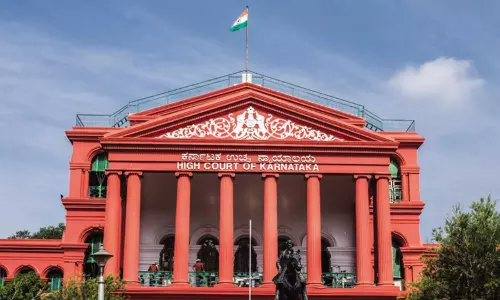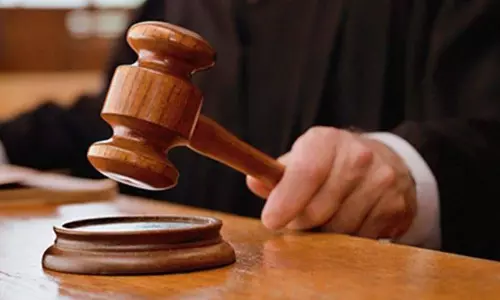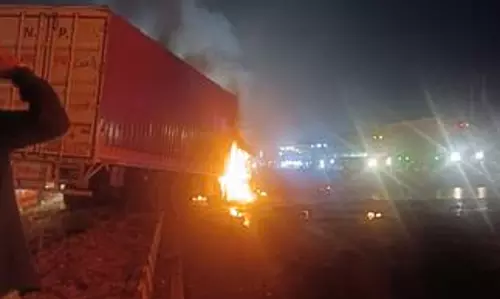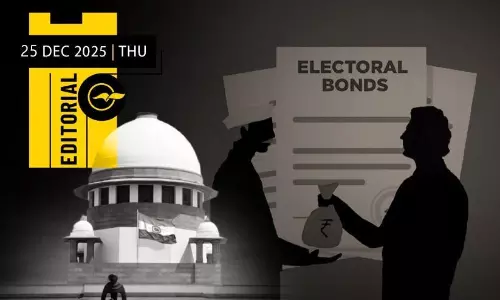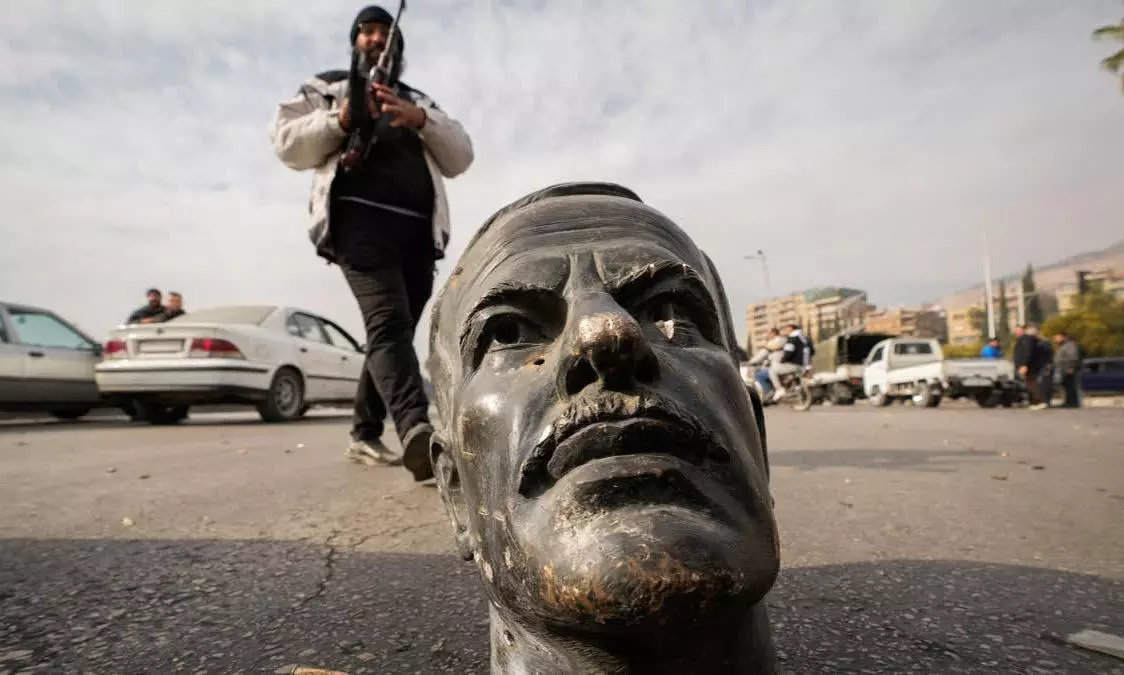
The fall of Assad: what lies ahead for Syria
text_fieldsOn December 11 to universal astonishment, Bashar Al Assad fled Syria. The president was granted asylum by Russia. This ended 54 years of the Assad dynasty. Dr. Bashar Al Assad had ruled his country since 2000. The soft-spoken ophthalmologist had a placid demeanour that belied the brutal nature of his regime.
The advance of Hayat Tahrir Al Shams (HTS) was stunning in its rapidity. In late November 2024, the Syrian Civil War was roughly where it had been for several years. Forces loyal to the Assad crime family controlled about 50% of the territory. They controlled about 75% of the population because they held the major cities.
HTS suddenly broke through. The Turkish-backed rebels also made major gains. HTS took Aleppo which is the largest city in Syria. They closed in on Damascus. Many military units simply abandoned their posts.
The regime insisted that President Assad was still in the country. But they did not show any video to prove this. Then Moscow soon admitted that Assad had fled. Syria has been a Russian ally since the Cold War. Russia retains two military bases in Syria. These are the only Russian military bases outside the former USSR. Russia really likes to have bases in the Middle East. Access to the Mediterranean is also seen as vital.
In 1970 Hafiz Al Assad, the father of Bashar, seized power in a coup d’etat. Hafiz Al Assad was been commander of the Air Force. Thereafter Air Force Intelligence was used to oppress the population and not simply to gather intelligence about aviation.
The Assad dynasty maintained itself in power through secularism, state terror, a surveillance state, propaganda and appeals to anti-Zionism. It fought against Israel and lost the Golan Heights.
The Assad regime faced a major rebellion in 2010 during the Arab Spring. The regime was willing to gun down hundreds of peaceful protestors. It had always been violently intolerant of all dissent. Its torture chambers and ubiquitous secret police had kept the lid on things for decades.
Some of those who rebelled formed the Free Syria Army. They were secularists who simply wanted democracy and human rights. Western countries gave non-lethal aid to the FSA.
Assad was highly cognizant that Western countries were paranoid about Al Qa’eda. Therefore, he claimed that all opponents of his were Al Qa’eda-inspired. In fairness, some of his enemies were religious maniacs. Anyone who was not Sunni was terrified of the Al Nusra Front. Some of the religious minorities and the moderate Sunnis reluctantly backed Assad because he seemed to be the only thing between them and annihilation.
Assad comes from the Alawi – a sub-sect of the Shias. The Shia comprise 10% of the Syrian populace. They dominated it by forging alliances with the 10% who are Christians, the 4% who are Druze, the 1% who are Yazidi, the 10% who are Kurdish and enough of the moderate Arabic-speaking Sunnis. The Shia took the lion’s share of the top jobs. The regime viewed religiously observant Sunni with suspicion.
Iran stepped in to save the Assad regime in 2010. Syria was an Iranian ally. The Turks stepped in ostensibly to protect the Turcoman ethnic minority in Syria. Ankara was also angry because the Syrian Civil War drove millions of Syrians to flee to Turkey. The Assad regime promised to reform in 2010 to stave off revolution. The Turkish Government was irate with all these broken promises.
The Kurds predominate in northeast Syria. Since 2010 they unofficially seceded from Syria. They teamed up with the Kurds in Northern Iraq. The Kurdish separatists declared their neutrality in the Syrian Civil War. The Islamists, the secular rebels and the Assad regime all left the Kurds alone.
Turkey did not want to see the Kurds in Syria break away. 20% of Turkey is populated by Kurds. In the 1980s Turkey fought against Kurdish separatists. Turkey does not want an independent Kurdistan on its border.
In 2013 Assad started using gas on enemy-held areas. Tens of thousands of civilians were murdered by this means. That is despite all the international conventions against chemical weapons. The United States had proclaimed the use of chemical weapons a red line. To use them would cause military action. However, when the British Parliament voted against military action, the USA decided not to go it alone. It was agreed that Syria would be disarmed of its chemical weapons and in return, there would be no military action by the United States. In any case, President Obama had been keen to limit US military involvement in the Middle East. He was trying to extricate the US from Iraq while winning in Afghanistan with a view to withdrawal from Afghanistan within a few years.
Since 2013 the Assad regime used chemical weapons many times. They calculated it had war-winning potential. Eventual air strikes by the USA, France and the United Kingdom did not degrade the Syrian Military sufficiently to alter Assad’s calculus.
Assad and Russia lied and lied and lied about the use of gas. Russia voted to prevent the UN investigation into the gas attacks. They knew what it would find!
In 2015 the rebels seemed to make major gains. There was a serious chance that the regime’s days were numbered. Russia entered the fray. The Russian Air Force bombed insurgent positions and saved Assad. The Iranian Revolutionary Guard Corps also fought for Assad.
The Israelis bombed both Assad’s forces and their opponents. The Israelis enjoyed seeing Syrians slaughter each other.
The United States also sent troops and illegally occupied some of Syria. Will the US now withdraw? Trump probably will.
In December 2024 when the Syrian Army disintegrated, this was a golden opportunity for Israel. The Israelis advanced and seized more of the Golan Heights. Since the fall of Assad, the Israeli Air Force has continued to bomb Syria.
Russia wants to retain those bases. Will the new rulers allow it? If they do, what will they want in return? They may demand the extradition of Assad. But Russia wants other tyrants to know that it will stand by them.
A new government has yet to be formed. Will it be inclusive? Is democracy even possible in Syria? Is a benign dictatorship the best that can be hoped for? After 13 years of fighting, it seems war is a way of life. Syria was never rich. It will take decades to rebuild. The country may yet face more years of bloody chaos.
Assad’s Prime Minister has been arrested by HTS. Whether he gets a fair trial will be a major litmus test for the new dispensation.




